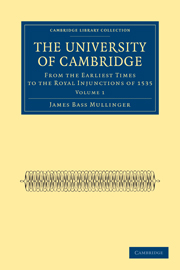Book contents
- Frontmatter
- PREFACE
- Contents
- CHAP. I FROM THE ROYAL INJUNCTIONS OF 1535 TO THE FOUNDATION OF TRINITY COLLEGE
- CHAP. II FROM THE FOUNDATION OF TRINITY COLLEGE TO THE ACCESSION OF ELIZABETH
- CHAP. III FROM THE ACCESSION OF ELIZABETH TO THE DEATH OF ARCHBISHOP PARKER
- CHAP. IV FROM THE DEATH OF ARCHBISHOP PARKER TO THAT OF LORD BURGHLEY
- CHAP. V COLLEGE LIFE
- CHAP. VI FROM THE DEATH OF LORD BURGHLEY TO THE ACCESSION OF CHARLES I
- APPENDIX
- INDEX
CHAP. I - FROM THE ROYAL INJUNCTIONS OF 1535 TO THE FOUNDATION OF TRINITY COLLEGE
Published online by Cambridge University Press: 05 November 2011
- Frontmatter
- PREFACE
- Contents
- CHAP. I FROM THE ROYAL INJUNCTIONS OF 1535 TO THE FOUNDATION OF TRINITY COLLEGE
- CHAP. II FROM THE FOUNDATION OF TRINITY COLLEGE TO THE ACCESSION OF ELIZABETH
- CHAP. III FROM THE ACCESSION OF ELIZABETH TO THE DEATH OF ARCHBISHOP PARKER
- CHAP. IV FROM THE DEATH OF ARCHBISHOP PARKER TO THAT OF LORD BURGHLEY
- CHAP. V COLLEGE LIFE
- CHAP. VI FROM THE DEATH OF LORD BURGHLEY TO THE ACCESSION OF CHARLES I
- APPENDIX
- INDEX
Summary
Cromwell elected chancellor of the university
The destinies of learning in England, in the year with which the preceding volume closes, must have seemed to depend on the decisions of a single mind. It illustrates the completeness of the revolution that was impending in the domain both of letters and of belief, that it was the newly-elected chancellor of the university who sent his predecessor to the scaffold. Months before his purpose found its accomplishment on Tower Hill, an entry among Cromwell's private memoranda,—‘Item: when Master Fisher shall to his execution?’—had recorded his stern and relentless design.
His claims to this distinction, as compared with those of preceding chancellors
Cambridge, by the general admission, had stood honourably by her late chancellor, but now that her generous patron was no more, the instinct of self-preservation became paramount. ‘The university,’ says Lloyd, ‘made Cromwell chancellor to save itself.’ Already Master of the Rolls, chancellor of the exchequer, and secretary of state, the signs of his growing power were such as none might safely disregard; although his claims, in other respects, might hardly have seemed to entitle him to this new distinction. Hitherto it had been deemed essential that the head of the university should have acquired a certain academic status or that he should represent the name and influence of some noble and powerful house.
- Type
- Chapter
- Information
- The University of Cambridge , pp. 1 - 86Publisher: Cambridge University PressPrint publication year: 2009First published in: 1873

